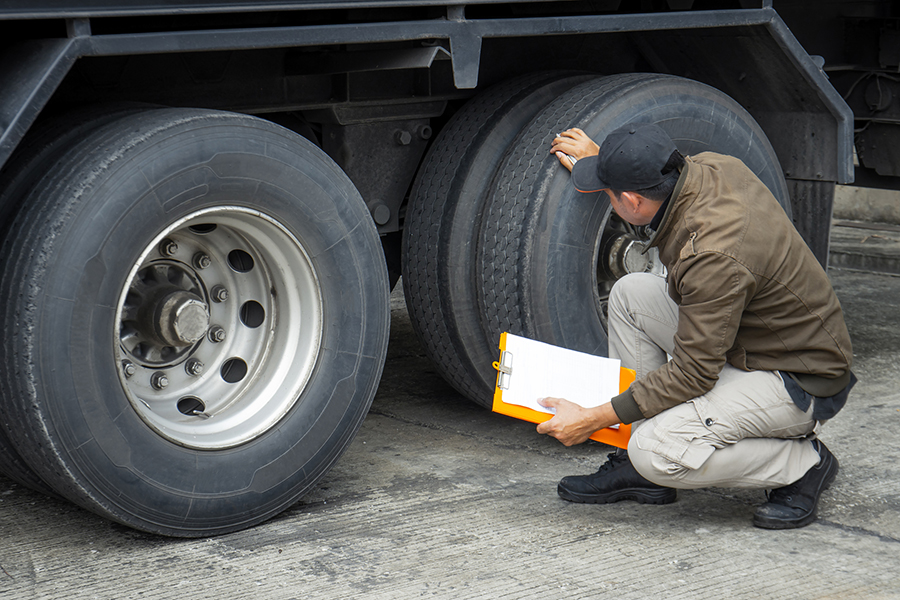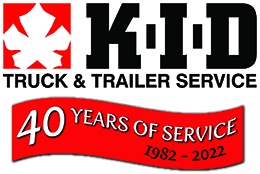
With all costs to operate a trucking company going up, it’s a good thing that Air is still relatively free. When it comes to commercial transportation, it’s the air inside the tires that supports the load being carried. Tire inflation is one of the most important and often overlooked maintenance items. It’s estimated that 95% of tire failures are due to low tire pressure. It’s a leading cause of roadside breakdowns and completely preventable.
An average fleet has approximately one third of tires underinflated and it’s costing them money. The general rule of thumb is for every 10 pounds per square inch (psi) of underinflation, it wastes 1 – 2% of fuel economy. Under-inflated tires will flex more than intended, generating heat and irregular tread wear, which leads to rapid degradation of tire life. According to Trucking Associations, a consistent 20% under-inflation in commercial tire pressure increases tread wear by 25% and reduces tire life expectancy by 30%. This results in significantly higher replacement costs and lower profitability for fleets.
Tires are engineered to operate at ideal profiles when traveling down the road. Manufacturers provide guidance on psi for vehicle requirements with load calculation and it’s usually available on their websites. A tire’s maximum inflation pressure is stamped on the tire’s sidewall and varies from tire to tire. The rim will also have a maximum, not to exceed, inflation rating. The vehicle’s recommended tire pressure is for cold tire inflation and should be checked in the morning before driving too many miles or the sun’s radiant heat affects it.
The air inside a tire expands when heated and contracts when cooled. Tires typically lose 2% of their air per month and temperature affects tire pressure. With the days getting shorter and temperatures getting colder, the fall is a critical time to check tire pressure more often than one a week. Every 5֯ Celsius drop in temp means tires will lose approximately 1 – 3 psi depending on tire size.
A high-quality, calibrated gauge is an indispensable tool in maintaining the right air pressure for medium and heavy-duty vehicle applications. If you have a higher budget, you can invest in a tire monitoring system. These digital applications provide real-time updates on tire pressure and can quickly identify problems before they become a significant enough issue to cause major wear damage or a potential blowout.
Tires are Going Up, again?
Tires are second highest equipment maintenance expense after fuel. Inflation is causing all costs to operate a transportation company to go up, including the price of replacement tires. Supply chain woes, higher commodity prices and a rubber shortage (it takes 7 years for a new tree to produce adequate rubber stock) are making the situation worse. These costs are being passed onto the end-user and typically include margin-improvement for the manufacturer. Most tire manufacturers, big and small, have raised their prices an unprecedented five times or more in the past year.
With dramatically increasing costs and raw material shortages, it tempting to buy a significantly cheaper, Tier 4 tire brand. Lower price is the number one factor driving operators to purchase less expensive offshore tires. The use of Tier 4 tires in the replacement market has increased 16% since 1998, while premium tires and retreaded tires have declined during the same period. One of the problems with Tier 4 tires is they can’t be recycled for new tire production because the material quality isn’t there. They’re ending up in landfills at a significantly higher rate, up to four tires, for every premium tire retreaded three times.
Another issue with cheap offshore tires is usually haven’t passed comprehensive safety checks or quality assurance tests before they leave the factory. Most imported Asian tires typically don’t have warranty coverage and aren’t supported for product liability insurance in North America. They don’t have a good reputation for quality, safety or reliability. Even the cost for these tires is increasing due to a sharp rise in commodity prices and spikes in ocean freight rates. Today’s high-quality retreads can extend the performance of premium tire casings by replacing the tread for less than purchasing a new tire while also reducing carbon emissions.
Tire Maintenance Support
Keeping tires properly inflated is an important part of a fleet’s routine maintenance program. It benefits the bottom line, makes vehicles safer and improves the driving experience. While K.I.D. Truck and Trailer Service does not sell tires, as a member of the Truck Pro banner program, we have an extensive network of trusted new and retread partners that we refer for service. If you need professional medium or heavy-duty truck or trailer maintenance support, the friendly experts at K.I.D. are here to help. Our replacement parts and service department get you back on the road with fully inflated tires.
Photo Credit: iStock
Tags: commercial fleet service, commercial transportation, commercial truck and trailer tires, costly truck repairs, family-run business values, heavy-duty trucking tires, making investments go further, tire inflation, truck and trailer parts burlington, truck and trailer parts milton, truck and trailer parts oakville, truck and trailer service burlington, truck and trailer service oakville, truck and trailer tires, truckpro halton region, value for trucking companies
